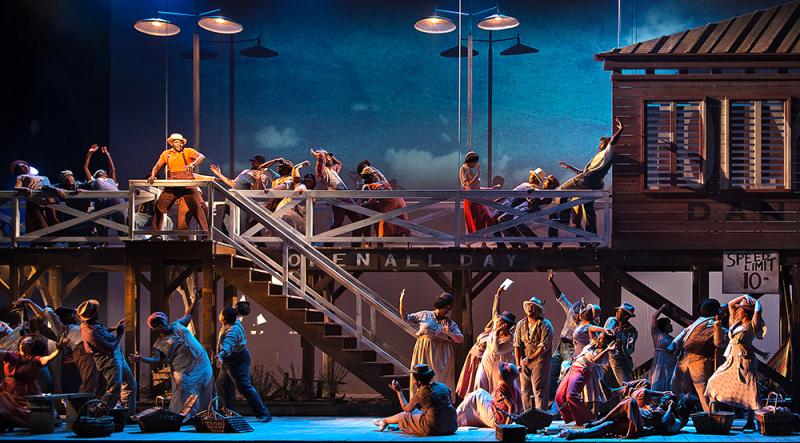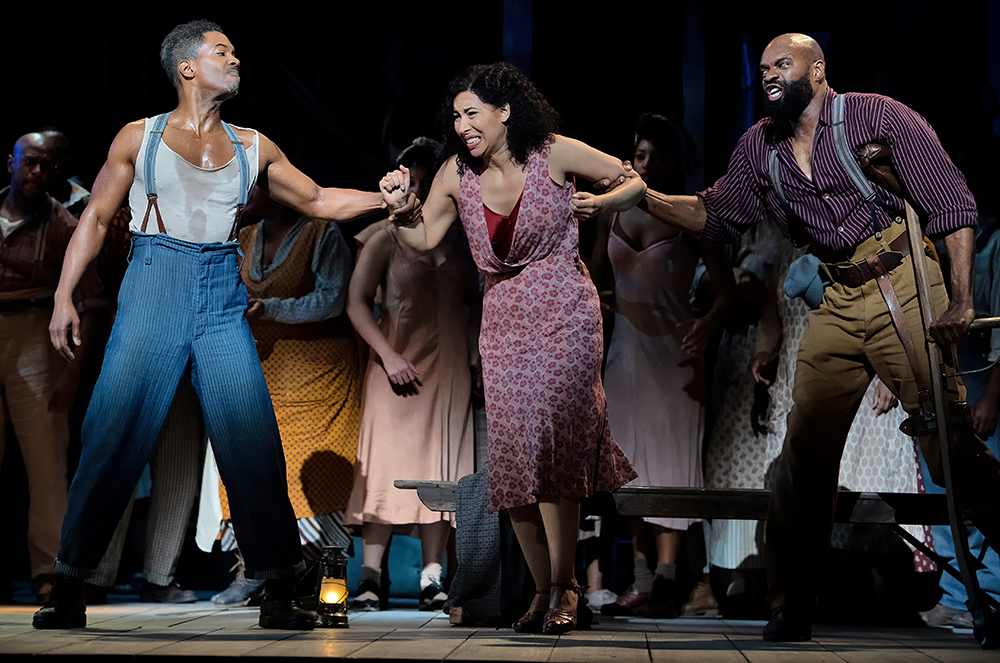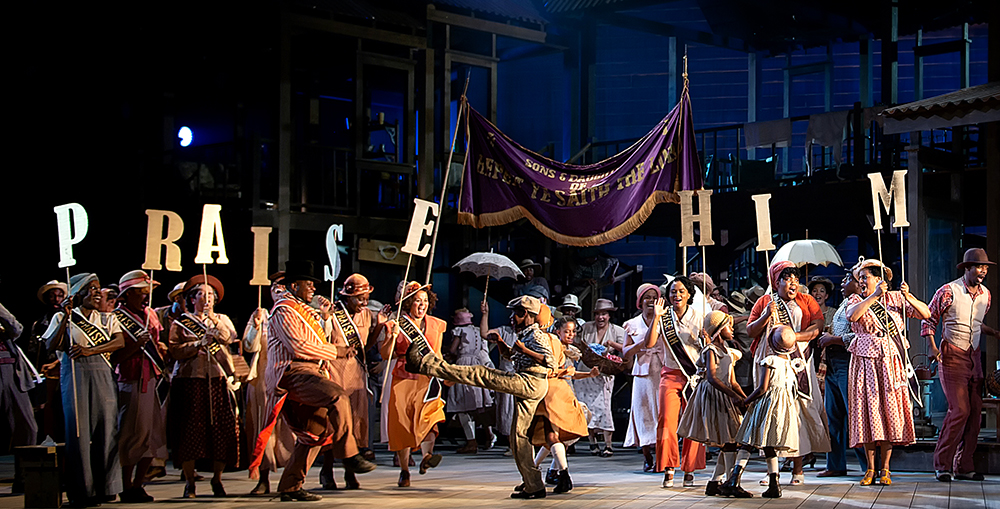Porgy and Bess, English National Opera review - strength in depth on Catfish Row | reviews, news & interviews
Porgy and Bess, English National Opera review - strength in depth on Catfish Row
Porgy and Bess, English National Opera review - strength in depth on Catfish Row
A heroic cast steers Gershwin's masterpiece home in style

After exhausting years of financial and artistic crisis-management at the Coliseum, English National Opera urgently needed an ironclad, feelgood success. This season’s opener, a somewhat idiosyncratic take on Strauss’s Salome, was unlikely to fit that bill.
Even more remarkably, given their history, ENO have never performed it. After all, it was ENO’s forerunner company at Sadler’s Wells that premiered Benjamin Britten’s Peter Grimes in 1945. And listening to Gershwin’s storm scenes, his drama-laden choruses, and his simmering musical tensions between a wounded hero and a community that both supports and stifles him, convinced me again that the fisherfolk of South Carolina (Britten saw Porgy and Bess in New York) helped spark the birth of their counterparts in Suffolk.
Michael Yeargan’s sets, Catherine Zuber’s costumes and Dianne McIntyre’s choreography all fed an evening of visual as much as musical spectacle. In the pit, the inimitable John Wilson – who keeps his spooky conductor’s hotline to the golden age of Broadway and Hollywood in perfect trim – drew bright, sharp and sassy colours from the ENO orchestra. At the outset, indeed, I worried that their flair and punch might overshadow the singing. The main set presents the seaside tenements of Catfish Row as the wall-less cells in some run-down skeleton of a Palladian country house. Two storeys of open rooms – with one central block, and two detachable wings – barely shelter the bustling tenants of this warehouse for poor, black fishing families. The set revolved regularly – perhaps too much. After the brief overture, Clara (Nadine Benjamin) had to launch with no preamble into “Summertime”: surely one of the toughest early calls in opera. To have the set beneath you twist at distracting angles just as you try to nail one of the world’s best-loved and most-recorded songs hardly sounds like easy living to me. Happily, “Summertime” returns in different, more ominous moods at intervals. Benjamin later had a chance to display a sweet depth of tone that put her in good company among an outstanding cast – and a magnificent chorus.
 As for the principals (both American), Nicole Cabell as Bess proved not a weak link in any way (this production has none) but a slightly foreign element – perhaps aptly, given that she stands apart from the crowd and, at the close, opts to take that ship for New York with drug-dealing Sporting Life rather than stay with the noble, crippled Porgy in the enfolding, enclosing confines of Catfish Row. Cabell’s soprano lent Bess a lyric polish and finesse that indicated that, in the Big Apple, she might set her sights on Carnegie Hall rather than Broadway. She acted powerfully and looked terrific, but her upwardly-mobile operatic patina made few concessions to the “folk” or even pop dimensions of Gershwin’s score. Then again, why should she when that very vocal contrast turned her great duet with Porgy (“Bess, you is my woman now”) into a thrilling highlight? Sometimes gravelly, often tender, always compelling, Eric Greene’s warm and winning Porgy inevitably recalled the Willard White of Simon Rattle’s fondly-remembered Glyndebourne production. Once or twice, he too had to contend with the over-busy, ever-spinning set. Stuck in a corner with his homies, he (delightfully) sang “I got plenty o’ nutting” just as elaborate stage manoeuvres annoyingly caught the eye to prove that, as yet, ENO doesn’t quite have that problem (or, perhaps, blessing).
As for the principals (both American), Nicole Cabell as Bess proved not a weak link in any way (this production has none) but a slightly foreign element – perhaps aptly, given that she stands apart from the crowd and, at the close, opts to take that ship for New York with drug-dealing Sporting Life rather than stay with the noble, crippled Porgy in the enfolding, enclosing confines of Catfish Row. Cabell’s soprano lent Bess a lyric polish and finesse that indicated that, in the Big Apple, she might set her sights on Carnegie Hall rather than Broadway. She acted powerfully and looked terrific, but her upwardly-mobile operatic patina made few concessions to the “folk” or even pop dimensions of Gershwin’s score. Then again, why should she when that very vocal contrast turned her great duet with Porgy (“Bess, you is my woman now”) into a thrilling highlight? Sometimes gravelly, often tender, always compelling, Eric Greene’s warm and winning Porgy inevitably recalled the Willard White of Simon Rattle’s fondly-remembered Glyndebourne production. Once or twice, he too had to contend with the over-busy, ever-spinning set. Stuck in a corner with his homies, he (delightfully) sang “I got plenty o’ nutting” just as elaborate stage manoeuvres annoyingly caught the eye to prove that, as yet, ENO doesn’t quite have that problem (or, perhaps, blessing).
This cast, though, shows terrific strength in depth. From Latonia Moore’s commanding gospel fervour as Serena to Donovan Singletary’s smoothly forceful Jake, Catfish Row emerged as a slum crammed with stars. It’s worth pointing out that South African singers took no fewer than five character parts, and they all excelled – whether Nozuko Teto’s strawberry seller or Njabulo Madlala’s Jim. At times, this almost felt like a Cape Town Opera benefit night. Their welcome presence proved again what an extraordinary nursery for the whole world of music theatre has developed at the tip of Africa. Meanwhile, Bess’s twin plagues, and twin tempters – the wheedling pusher Sporting Life, and the abusive thug Crown – strutted their stuff in a chilling double dose of what Gershwin probably never called toxic masculinity. Frederick Ballentine and Nmon Ford (as a horribly charismatic Crown) deserved all their mixed cheer-boos at the close. (Pictured above: Nicole Cabell with Nmon Ford and Eric Greene)
 For all the individual talent on display, perhaps the ensemble as a whole did most to make this Porgy sing. Each of the big choral numbers blew us away as decisively as the fatal second-act storm (surely an inspiration for Britten) which provokes the final denouement. Just one example: the church picnic on Kittiwah Island, where the painterly set showed its versatility by morphing into a pier and boardwalk backed by glowing, shifting summer skies. Kudos, throughout, to video designer Luke Halls. Ballentine’s Sporting Life quipped and swaggered beautifully through the irreverent gags of “It ain’t necessarily so”. But then the smart ensemble work – with a baby’s cradle casually chucked away – and Serena’s stirring rebuttal (fabulous ferocity again from Latonia Moore) put his sceptic’s anthem in its true context as the special pleading of a manipulative rogue.
For all the individual talent on display, perhaps the ensemble as a whole did most to make this Porgy sing. Each of the big choral numbers blew us away as decisively as the fatal second-act storm (surely an inspiration for Britten) which provokes the final denouement. Just one example: the church picnic on Kittiwah Island, where the painterly set showed its versatility by morphing into a pier and boardwalk backed by glowing, shifting summer skies. Kudos, throughout, to video designer Luke Halls. Ballentine’s Sporting Life quipped and swaggered beautifully through the irreverent gags of “It ain’t necessarily so”. But then the smart ensemble work – with a baby’s cradle casually chucked away – and Serena’s stirring rebuttal (fabulous ferocity again from Latonia Moore) put his sceptic’s anthem in its true context as the special pleading of a manipulative rogue.
For good or ill, community shapes every choice on Catfish Row. To augment the vibrant togetherness of Robinson’s ensemble scenes, Wilson’s conducting brought out the unending stylistic clash between personal desires and collective values. The choruses embrace us raptly in the more traditional elements of Gershwin’s diverse score – which so brilliantly incorporates half-a-dozen different strands from the African American musical patchwork. Here, the people en masse cling to gospel, to spirituals, to work-songs: those time-worn tokens of harmony and solidarity in the face of relentless racism and poverty. In contrast, Bess and her outsider men strike out into the musical future, as when Sporting Life lures her away with that New York-bound boat. He sings in a big-band vein that drags us north, into the new age of swing. We could almost be listening to Frank Sinatra.
The folk of Catfish Row will never reach that promised land of which they sing so beautifully. But the Coliseum show carries us much closer to it than any of sawn-off, musical-style abridgement of Porgy and Bess ever could. Laden with vocal treasures, splendidly rigged out, and skippered on every deck with skill and dash, this is a boat that should not be missed.
rating
Explore topics
Share this article
The future of Arts Journalism
You can stop theartsdesk.com closing!
We urgently need financing to survive. Our fundraising drive has thus far raised £49,000 but we need to reach £100,000 or we will be forced to close. Please contribute here: https://gofund.me/c3f6033d
And if you can forward this information to anyone who might assist, we’d be grateful.

Subscribe to theartsdesk.com
Thank you for continuing to read our work on theartsdesk.com. For unlimited access to every article in its entirety, including our archive of more than 15,000 pieces, we're asking for £5 per month or £40 per year. We feel it's a very good deal, and hope you do too.
To take a subscription now simply click here.
And if you're looking for that extra gift for a friend or family member, why not treat them to a theartsdesk.com gift subscription?
more Opera
 La bohème, Opera North review - still young at 32
Love and separation, ecstasy and heartbreak, in masterfully updated Puccini
La bohème, Opera North review - still young at 32
Love and separation, ecstasy and heartbreak, in masterfully updated Puccini
 Albert Herring, English National Opera review - a great comedy with depths fully realised
Britten’s delight was never made for the Coliseum, but it works on its first outing there
Albert Herring, English National Opera review - a great comedy with depths fully realised
Britten’s delight was never made for the Coliseum, but it works on its first outing there
 Carmen, English National Opera review - not quite dangerous
Hopes for Niamh O’Sullivan only partly fulfilled, though much good singing throughout
Carmen, English National Opera review - not quite dangerous
Hopes for Niamh O’Sullivan only partly fulfilled, though much good singing throughout
 Giustino, Linbury Theatre review - a stylish account of a slight opera
Gods, mortals and monsters do battle in Handel's charming drama
Giustino, Linbury Theatre review - a stylish account of a slight opera
Gods, mortals and monsters do battle in Handel's charming drama
 Susanna, Opera North review - hybrid staging of a Handel oratorio
Dance and signing complement outstanding singing in a story of virtue rewarded
Susanna, Opera North review - hybrid staging of a Handel oratorio
Dance and signing complement outstanding singing in a story of virtue rewarded
 Ariodante, Opéra Garnier, Paris review - a blast of Baroque beauty
A near-perfect night at the opera
Ariodante, Opéra Garnier, Paris review - a blast of Baroque beauty
A near-perfect night at the opera
 Cinderella/La Cenerentola, English National Opera review - the truth behind the tinsel
Appealing performances cut through hyperactive stagecraft
Cinderella/La Cenerentola, English National Opera review - the truth behind the tinsel
Appealing performances cut through hyperactive stagecraft
 Tosca, Royal Opera review - Ailyn Pérez steps in as the most vivid of divas
Jakub Hrůša’s multicoloured Puccini last night found a soprano to match
Tosca, Royal Opera review - Ailyn Pérez steps in as the most vivid of divas
Jakub Hrůša’s multicoloured Puccini last night found a soprano to match
 Tosca, Welsh National Opera review - a great company reduced to brilliance
The old warhorse made special by the basics
Tosca, Welsh National Opera review - a great company reduced to brilliance
The old warhorse made special by the basics
 BBC Proms: The Marriage of Figaro, Glyndebourne Festival review - merriment and menace
Strong Proms transfer for a robust and affecting show
BBC Proms: The Marriage of Figaro, Glyndebourne Festival review - merriment and menace
Strong Proms transfer for a robust and affecting show
 BBC Proms: Suor Angelica, LSO, Pappano review - earthly passion, heavenly grief
A Sister to remember blesses Puccini's convent tragedy
BBC Proms: Suor Angelica, LSO, Pappano review - earthly passion, heavenly grief
A Sister to remember blesses Puccini's convent tragedy
 Orpheus and Eurydice, Opera Queensland/SCO, Edinburgh International Festival 2025 review - dazzling, but distracting
Eye-popping acrobatics don’t always assist in Gluck’s quest for operatic truth
Orpheus and Eurydice, Opera Queensland/SCO, Edinburgh International Festival 2025 review - dazzling, but distracting
Eye-popping acrobatics don’t always assist in Gluck’s quest for operatic truth
